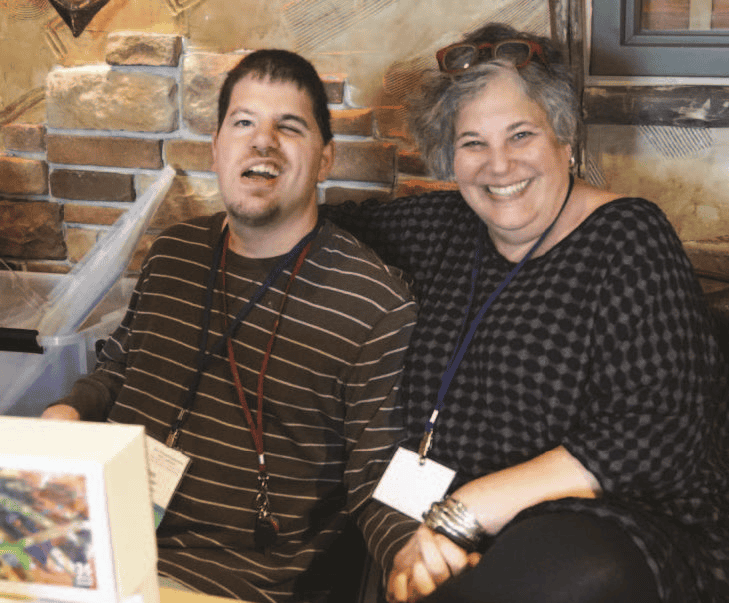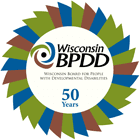Family Engagement:
Individuals
Why Family Engagement Matters to Individuals
According to The Arc’s national Family & Individual Needs for Disability Services (FINDS) 2017 survey, a significant percentage of people with IDD live with their families. Family members play a crucial role in the health, safety, and wellbeing
of adults with IDD. Adult service systems are often not set up to fully engage, educate, and support families of adults with disabilities. This Blueprint section aims to provide practical guidance for individual families to enhance the lives of their loved ones with IDD (1). In the Wisconsin Promise grant, family engagement included the use of a family navigator to help coordinate services
and navigate systems. The focus of this service in the demonstration grant was to increase employment expectations and help with transition services and supports. But families and youth were often engaged in a whole set of goals outside of just employment. Family navigators often identified other barriers impacting families that would create success for the youth in transition (2).
In a study of families of children with autism spectrum disorders, expanding supports, including family engagement and navigation was a recommended promising practice. As families begin engagement with the adult service system, they are challenged with navigating new and complex eligibility requirements and funding sources. In addition, they may be helping their family members find new providers, housing, employment, and transportation. Families that are not guardians can often face a new level of disruption in an effort to support their loved one. Families can also easily become overwhelmed by the new factors that they need to consider. Family navigation and services coordination was particularly needed during the transition from transition to adulthood (3).
Family members, as guardians or informal supporters, are important partners of adults with IDD for building safe, full lives. However, the lack of engagement and support from the service system can lead to concerns such as overprotection, rights restrictions, segregation, limited community connections, and major disruptions when primary caregivers pass away. It is crucial for families to take proactive steps to address these challenges. The Living Well grant investigated the best and promising practices that would provide authentic engagement with families while providing a level of respect for the rights of the individual to make their own choices.
How Families Can Get More Engaged
Person-Centered Planning: Understanding the idea of person-centered planning that focuses on your adult family members’ strengths, preferences, and desires. Families can collaborate with professionals to create a personalized
plan to meet the needs and goals of your family member. Be involved in the review of this plan and work to make adjusts to ensure it changes as your family member’s life and goals change.
Future Planning: Futures planning is imperative to ensure that the life your family membered desires is able to continue when you are no longer there to provide care or financial resources. The plan will help you create a roadmap
for your family member’s future. These workshops often cover legal, financial, and lifestyle considerations, providing valuable guidance for long-term planning.
Use Supported Decision-Making: Families can use alternatives to guardianship called supported decision-making to help facilitate decision-making. This tool can empower a family member to assist the person in make choices regarding their life, healthcare, and overall well-being with the necessary support without removing their rights.
Understand Rights: Families should learn about human rights and the legal rights of individuals with disabilities. Rights that are important to understand are related to education, employment, housing, privacy, abuse/neglect and healthcare. Families can advocate for your family member to be able to assert their rights and support them in these activities. As a family member, you should understand about the Dignity of Risk and what would be considered overreach.
Have High Expectations for Employment and Community Life: Families should have high expectations for their family member’s employment opportunities. Often, families are told their child will not be able to work. Families should help the person explore vocational training programs, supported employment, and inclusive workplaces that align with their skills and interests. Families can promote active participation in community activities and social events. It is important to assist your family member to build a circle of connection and to encourage the development of meaningful relationships to enhance their life.
Attend Conferences and Trainings: One way to get involved and learn more about the resources for your family member is to attend conferences and training sessions focused on disabilities, services, housing, employment, community inclusion, and other relevant topics. It can help you learn about anything changing in your state and new resources that can positively impact your family members life. In addition, you can meet other family members and
people with disabilities who can serve as a support to you and your family members.
Tools for Individuals
The Arc Future Planning– A future plan is a guide for people with intellectual and developmental disabilities (IDD) to lead a good life as independently as possible. It can also help people with IDD reach their goals and dreams. The Arc has created the “Build Your Plan”® tool that enables families to create accounts and begin to build their plans. Agencies can support families to use this resource to develop a Futures Plan.
LOV Inc Fearless Future– A Wisconsin Living Well provider offers future planning. The Fearless Future workshops include five educational sessions individuals with disabilities and their team create their own Fearless Future Plan. Teams can include the member, their primary caregiver, family members, friends, and paid. The workshops were designed by families to think critically about their loved one’s independence when their primary caregiver is no longer able to care for them.
Supported Decision-Making– Supported decision-making empowers individuals with disabilities to make informed decisions about their life that protect their rights and ensure their safety and privacy. It involves family and friends working
together to help them make complex decisions. Service providers can share the information and tools from the WI BPDD website with families.
Let’s Talk About Rights Guides– Rights are things that people can have or do. People with disabilities should be allowed to have and do all the same things as people without disabilities. When people understand their rights, they have better
lives. The WI BPDD Living Well Let’s Talk About Rights booklet series has one that is specific for families and guardians.
Let’s Talk About Rights Video Series – This video series is meant to accompany the WI BPDD Living Well Let’s Talk About Rights guides. There is an introduction video and a video for each rights areas. The videos feature self-advocates sharing their perspectives about rights. Families can watch these videos to get a better understanding of the lived experience of people with disabilities and how they can support their family member.
Self-Determination Channel– This channel from WI BPDD is dedicated to sharing the voices of self-advocates about making choices and speaking up. The channel has many powerful videos that families can learn more about the life
experience of people with disabilities.
Community Conversations or Focus Group – Community conversations and focus groups can be an opportunity for family members to provide feedback on different topics that relate to the lives of their family members. It is important for
family members to attend and provide feedback on different
topics presented.
Reflection Activity
Download the Reflection Activity to make your Family Engagement Action Plan!

Navigate the Blueprint
In 2018, Wisconsin service provider Living Our Visions, Inclusively (LOV, Inc.) piloted their first future planning workshop called Fearless Future. Since that time, 41 families have participated.
Real Lives. Real Connections.
“Seeing adults with disabilities present and share their advocacy stories and talk
about their lives helps me feel better for the future for my child who has a disability.
It is reassuring to hear advocates talk about having their own apartments, going to school, working, and having friends. It helps inspire me to be sure my child has opportunities, true choices, and agency.”
– Family Member

